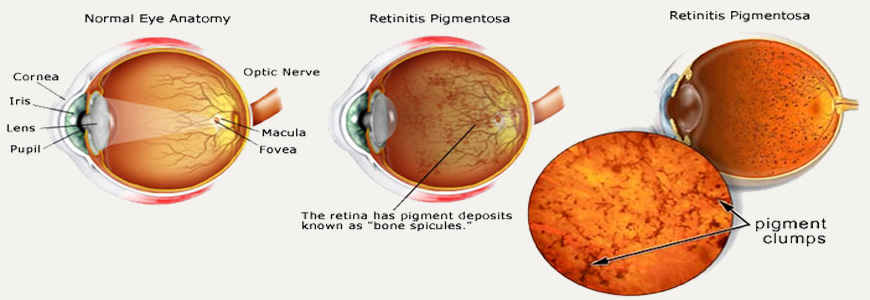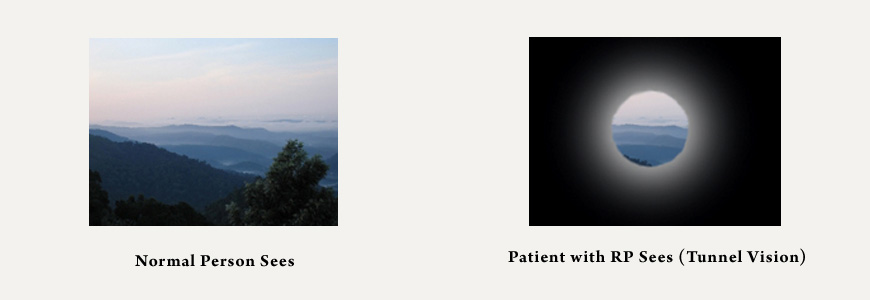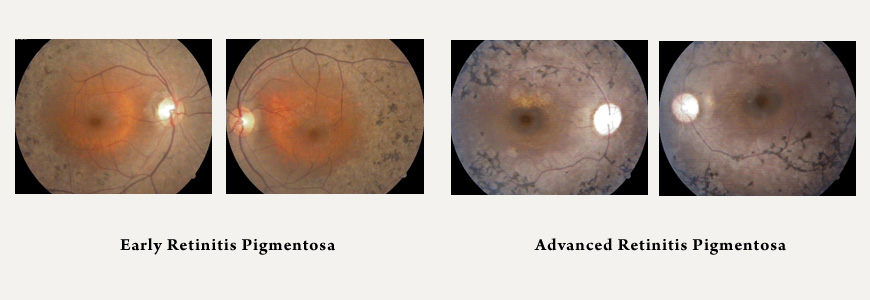Retinitis Pigmentosa
What is retinitis pigmentosa ?
Retinitis Pigmentosa or RP is the name given to a group of eye diseases that lead to slow damage of the photoreceptor cells of the retina. These photoreceptor cells are normally responsible for capturing and processing light rays and helping us to see. As these cells die in RP, Patients Experience Progressive Vision Loss.
There are 2 types of photoreceptor cells, Rod Cells and Cone Cells. Cone Cells are concentrated in the center of the retina and allow us to see fine details in the center of our vision. They also allow us to perceive color. Rod Cells are concentrated in the peripheral part of the retina and provide us with side vision. They also help us to see in dim light. In RP, it is the rod cells that are mainly damaged.

How does one get RP ?
RP is an inherited disorder programmed into the cells and not caused by injury, infection or any other external agent. Gene mutations send faulty messages to the retinal cells which lead to their progressive damage. These mutations can be passed from parent to offspring. So it is strongly recommended that all members in the family of a patient diagnosed with RP must get their eyes checked by a retina specialist.
Parents may have no symptoms themselves, but may have some children who are affected and others who are not. Similarly, an affected parent could have affected and unaffected children. In some families only the males are affected, but females can transmit the disease to their sons.
What are the symptoms of RP ?
RP is typically detected in adolescents and young adults. It is a progressive disorder. The rate of progression and degree of visual loss varies from patient to patient. Initially there is reduced night vision. Parents should specifically note if their children have difficulty in walking around or playing when the lights are dim. This is followed by a slow loss of peripheral vision. This happens in more advanced cases when only the central part of the vision remains intact leaving a "Tunnel Vision".
Most people with RP may become "Legally" blind by age 40, with a central visual field of less than 20 degrees in diameter. But because of the central vision being preserved they may still be able to perform many activities.
Eventually, in a few advanced cases, There may be significant loss of functional vision, Once the optic nerve connecting the eye to the brain gets significantly damaged.
What tests can help ?
Vision Test : This test measures the accuracy of central vision and provides spectacle prescription so that the patient can best use the remaining vision.
Ophthalmoscopy : A retina specialist performs a detailed examination of the eye using a special magnifying glass.
Visual Field Test : This test uses a machine to measure how much peripheral vision is left and is an excellent tool to assess the progress of the disease.
Fundus Photography : This helps to keep a permanent record of the condition of the retina at that moment and is useful to compare in future tests.

How do we treat RP ?
Unfortunately till date there is No Definite cure for RP yet. A nutritional therapy using vitamin A supplements may slow progression in many patients.
There are also several areas of research that offer promise for halting the disease or restoring vision loss, but none of them have been established or proven effective yet. These include :
Retinal Cell Transplantation
Gene Therapy
Pharmaceutical Therapy
Nutritional Therapy
Micro - Current therapy appears to provide many patients with a temporary subjective improvement in their vision. It has no side - effects and can be self - administered by the patient at home.
Discussing inheritance patterns and family planning can be useful. Occupational therapy is important because it's easier to adjust to declining vision in earlier stages of vision loss.

Low Vision Aids (LVA)
Although not a treatment for RP, LVA are useful for maintaining independence of the patient. Low Vision specialists available at Retina Foundation can make personalized recommendations for Mechanical, Optical, Electronic and Computer - Based Low Vision Products.